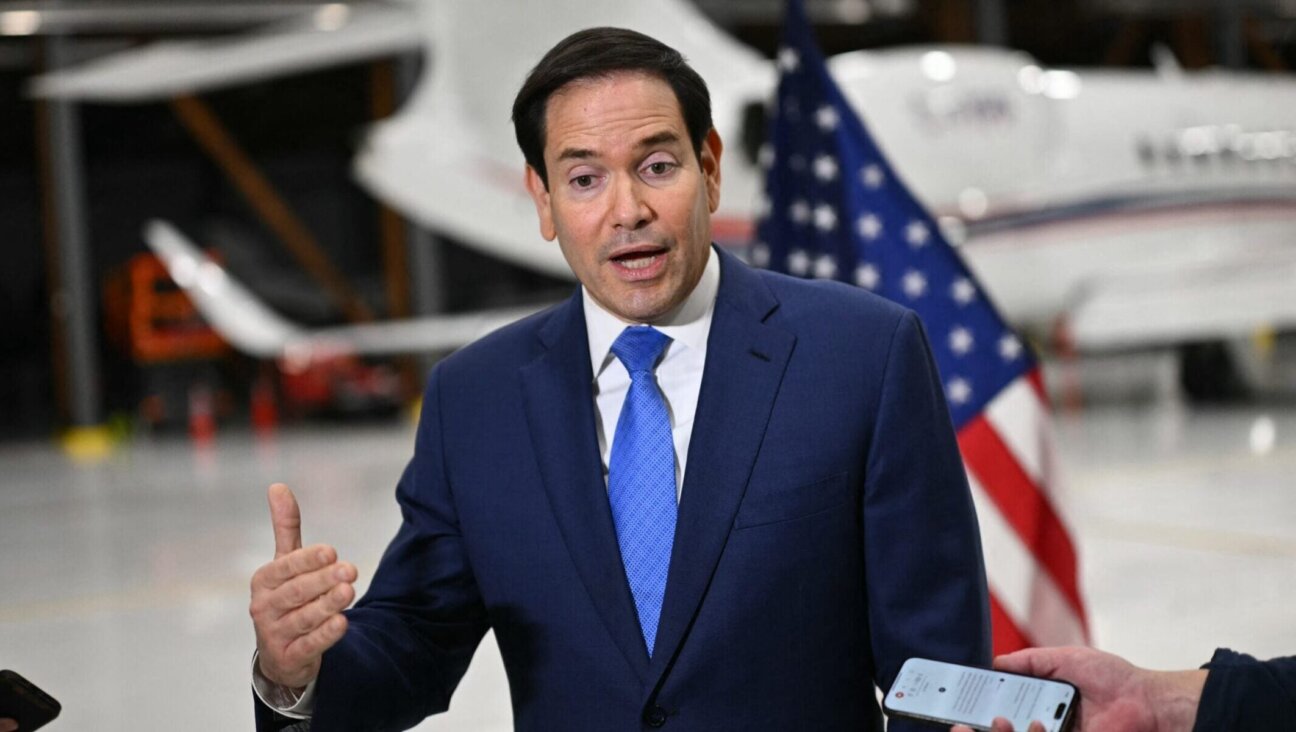She wrote the book on George Soros. So what does she think about all those conspiracy theories?

Image by getty images
(JTA) — Journalist Emily Tamkin’s comprehensive dive into the influence of George Soros is coming out into a very different world than she thought it would be released into.
When she started, following the election of President Donald Trump, conspiracy theories about Soros were beginning to make the leap to mainstream in the United States.
More recently, far-right conspiracy theorists have also blamed the 89-year-old Jewish billionaire philanthropist for the Black Lives Matter protests — he is paying protesters and “funding antifa,” they say — and the coronavirus pandemic. Anti-Semitic conspiracy theories about Soros have reached new heights, with half a million negative messages flooding Twitter every day last month, according to an Anti-Defamation League analysis. World leaders, including Trump, have amplified them.
That means Tamkin’s book, “The Influence of Soros: Politics, Power, and the Struggle for an Open Society,” is arriving at a fortuitous time. Of course, the New Statesman editor said, there would never be a bad time for a book explaining some of the most durable anti-Semitic tropes of our time.
“On the one hand, I thought, wow, the book is coming out with all of these conspiracy theories about him swirling in the news!” Tamkin told the Jewish Telegraphic Agency from her home in Washington, D.C.
“And then I thought, well, part of the reason that I wrote the book is that conspiracy theories are seemingly always swirling about him in the news.”
Tamkin’s book addresses not only Soros conspiracy theories but the theories at the heart of his philanthropy and what drives Soros to give so much money.
“The protests really do drive home the relevance of the text of the book,” she said. “A protest is people demonstrating because they want to be able to more fully participate in democracy and in society, and that’s fundamentally what Soros’ philanthropy is all about.”
In a wide-ranging conversation, we talked all things George Soros, “perfect” anti-Semitism, the paradox of billionaire philanthropists and the Google alerts Tamkin uses to monitor the evolution of Soros chatter online. This interview has been lightly edited for length and clarity.
*JTA: ** What surprised me the most was how recently the Soros conspiracy theories, or as you call it “Soros-as-bogeyman,” really entered the mainstream. For some reason, I thought it had been around for decades.***
Tamkin: It’s both, right? It has been around for decades. In the 1990s, you do have leaders of European countries who are not fringe figures talking about it.
**Yes, true. It just struck me when you write about how much the conspiracy gained momentum in 2015. Can you expand upon why you think 2015 was such a turning point for the spread of the Soros conspiracy theory? **
It’s a confluence of factors. One, it was the introduction of certain American political actors, namely Arthur Finkelstein. [Finkelstein, who died in 2017, was a conservative political strategist.] When people say, “Oh, wow, these conspiracy theories are the same in all these different countries,” in some cases, that’s because you literally have the same people working in these different places.
Two, it’s that you have people — specifically in Central and Eastern Europe — realizing that the European Union and the promised democratic liberal project was not going to give them everything that they had thought it was going to give them. For that reason, people are disaffected, they look for leaders who will play on that disaffection, and those leaders, in turn, need to do something because they can’t actually make it all better. In [Hungarian Prime Minister Viktor] Orban’s case, rather than attacking the political opposition, which would have only built up that political opposition, he attacks George Soros.
The [third] reason that I think 2015 specifically is such a turning point is that you have a migration crisis in Europe. Balint Magyar, who’s quoted in the book, is this sociologist [who] was in the pre-Orban government. And the way he put it to me is that the perfect “other” is not a liberal professor. The perfect other is a migrant. If you can have this famous, hated figure onto whom everyone can project their own prejudices and blame *him *for this uncertainty and the entrance of these people who you’d rather not have in your country, and you can vilify [those migrants] in the process, your political situation becomes much stronger and you can distract from some of the realities on the ground in your country. And you can distract from your own alleged corruption and you don’t need to build up any of your political opposition.
OK, I want to dive into all of that. Let’s start with Arthur Finkelstein. What was so interesting to me was that he’s a Jewish political strategist who is responsible for Orban and so many leaders’ embrace of the anti-Soros campaigns. Do you find it contradictory that this Jewish man helped spread one the biggest anti-Semitic conspiracy theories? How do you understand that?****
I think that it speaks to two things. The first is that there are some people who point to this part of the story and say, “Well, it just goes to show that it’s not really an anti-Semitic conspiracy theory. It’s just an opportunistic conspiracy theory.” And to that I would say if you are willing to use anti-Semitism because of opportunity, then you are comfortable with anti-Semitism, which I would invite you to think perhaps means that you are an anti-Semite.
And the second thing is that Finkelstein had first worked with [Israeli Prime Minister Benjamin] Netanyahu. There’s a really important element to the story, which is that Israel also deals in these anti-Soros conspiracy theories. Soros has a very different understanding of what it means to be Jewish than Israel does. His Jewishness is not wrapped up in the State of Israel. For him, it’s more about universal human rights and universal values, and it’s not about support of the Zionist project.
When you have Netanyahu’s son [Yair] go to Budapest and bash Soros, and tweet out that Hungary is such a wonderful place because it’s bringing back Christian Europe, on the face of it there is a conflict there: Why is the offspring of the prime minister of the Jewish state spreading anti-Semitic conspiracy theories? But I don’t see it as “That’s crazy, a Jewish person is attacking a Jewish person!” I see it as one understanding of Jewishness sacrificing another understanding of Jewishness for greater political gain.
**Soros doesn’t really engage with his Jewish identity in the way we typically see major Jewish philanthropists think about their Jewishness. You write about this in “The Influence of Soros,” but do you really think it was because of that one awful experience with the Jewish charity groups in the U.K.? **
[As Tamkin writes in “The Influence of Soros,” when Soros made it to London after the Holocaust, he applied to the Jewish Board of Guardians for a stipend and was rejected. He then broke his leg, reapplied, and the charity agreed to give him money, “provided he came to their office, climbing stairs with a broken leg, to get it.” Soros, Tamkin continues, “wrote to the chairman of the board and said he was hurt to find that this is how one Jew treats another.” They then sent him money, and Soros kept collecting long after his broken leg had healed. Soros tells this story as an example of ways people take advantage of charitable giving.]
That is part of it; the reason that I’m comfortable saying that is that when I went to Sarajevo, I spoke to this man by the name of Jakob Finci. Finci got all these people out of Sarajevo during the war, went on to run the Open Society in Sarajevo, and is now very involved in Jewish life in Sarajevo. What he told me was that back then, in the ’90s, his was the first Jewish organization to which Soros ever gave money because [Soros] had these negative experiences with Jewish charities in London during his time there. Even when [Soros] gave them the money, he said, “I don’t want this to only be used for Jews, I want you to use this for everyone.”
I also think one needs to understand that in Budapest, at the time that Soros was there, many Hungarian Jews thought of themselves first as Hungarians. And that part of the tragedy of Nazi occupation and life under the Arrow Cross — besides the obvious tragedy of the Holocaust — was this trauma of having your identity taken from you. I personally am a Jewish woman — I’m not comfortable telling another Jewish person who’s lived through that how to process that. If that experience does not make you want to embrace your Jewishness or Judaism, I’m personally not going to say, “Oh, you’ve interpreted Jewishness wrong.”
Finally, I do think that there’s something to be said for the fact that the way he relates to his Jewishness is, “Oh, I was persecuted because I was Jewish; therefore, what I want to do is to help other people who find themselves persecuted because of whatever they are.” To me, that is also a Jewish value.
Going back to the reasons for the rise of Soros conspiracy theories in 2015, you write in the book that “the idea of the Jew bringing in immigrants is, in a certain sense, the most perfect antisemitism.” Can you expand on why the archetype of the migrant as “the perfect other” as you discussed before, and Soros as the archetype of anti-Semitic conspiracy theories is this powerful combo?
Let’s think about the reason that a Jewish person would want to “invade a country with foreigners.” What you’re saying is that Jewish American, that Jewish Hungarian, that Jewish whatever, is not really of that country — and that’s why they’re trying to undermine it. It’s the idea of perpetual otherness that you’ll never really be of this place, no matter if you’re from there, no matter how many years you’ve spent there — there’s nothing you can do.
The idea that it’s the Jew who corrupts the nation, either through his own being or by adding people from another place — not considering that these people are fleeing some of the most horrific experiences known to humankind, but that they’re being brought in because the Jew is trying to corrupt the nation — that is just, in my mind, powerful anti-Semitic sentiment. It’s the otherness, but it’s also the element of the puppeteer: The idea that there is anybody who’s bringing these people and they’re not, of their own agency and of their own will, fleeing.
I should add that it’s not only the most perfect anti-Semitism, it’s also many other forms of bigotry. Because ultimately, yes, Soros and Open Society are attacked by this, and yes, I personally don’t see how you can disentangle this from, for example, the shooting at the Tree of Life synagogue, which was attacked in part because of their work with HIAS. But in the case of immigrants, anti-Semitism is the means to an end [with regard to] xenophobia. So Jews are hurt by it, but also when you pass a “Stop Soros” law that makes it illegal to help asylum seekers and migrants, you’re also hurting those asylum seekers and migrants.
Yeah, it’s similar to how anti-Semitism is so tangled up in white supremacy.
Right, and how weaponization against Jewish people is used as a way to get at these other populations. I mean, you’re seeing that now with the [Black Lives Matter] protests. What does blaming Soros do? Does it hurt Soros and Jewish people? I would say yes, but it’s also meant to strip the agency and legitimacy of protests that are about Black Americans. The anti-Semitism is a means to this other discriminatory end.
That brings me to my next question. For me, Trump’s tweet blaming the Kavanaugh protesters on Soros showed how mainstream the Soros anti-Semitic conspiracy theory had really become. What was that moment for you? When you realized, wow, the Soros conspiracy theories are everywhere? Or have you always felt that way?
In 2017, I wrote a long article on Soros in Central and Eastern Europe. Soros conspiracy theories had been in the U.S., but the next year they were everywhere, and they were coming from literally the most powerful person in the country.
What I thought was so interesting about that was that people seized on the fact that the two women who confronted [then-Sen.] Jeff Flake in the elevator were associated with a group that got money from Open Society, as if that somehow meant that the claims that Soros had paid for the placards was true. There has to be some way to distinguish, “yes, this person is supportive of progressive causes, and, yes, his foundations have given tremendous money to those causes” from “Soros is organizing these protests.” The latter completely takes the agency away from the individuals and the legitimacy from the protests.
With regard to those #MeToo protests at Kavanaugh’s hearing, and now the Black Lives Matter protests, how do you respond to seeing Soros brought up again and again?
The more you look at it, the more you see — across the globe and across decades — there is a pattern here: The idea of “open society” is about expanding who gets to participate in the democratic process. Part of me when I see his name brought up, it’s like, “You’ve got to be kidding me! Again? Soros mentioned again?!” But mostly, of course he’s getting mentioned again because he’s being brought up in conjunction with the expansion of democracy. Of course he’s getting brought up in that because that’s what his foundations have given all this money to, and also people know that using his name is a quick and easy way to delegitimize what is legitimate criticism of different governments and different parts of society.
We haven’t actually talked about his philanthropy yet. In the book you talk about the paradox of philanthropy, how Soros’ giving reproduces inequalities, even as it is meant to lessen them. How does Soros navigate that? Do you actually think there is a way to navigate this paradox successfully?
OK, so three things. The first is it’s certainly more complicated than I maybe thought starting out, which was that everybody was going to come together and join me in [saying] that this is a bad system. When I went to talk to the people who work in these spaces, be it in Syria during the war, be it in Baltimore on criminal justice reform, they were like, “What are you talking about? No, it’s good that somebody is giving us money because nobody else would have.” It’s fine for me sitting here in Washington, D.C., to [say] we need to redistribute this wealth. I’m making that argument coming from a place of trying to be more supportive of more people, but there are times where I do think that it’s context-specific.
Two, I do think that Soros does understand it on some level because he has called for a wealth tax. I do think there’s some level of recognition, but he has said he kind of played by one set of rules making money and another set of rules in his political or philanthropic life. The way I see it, if you are a large enough financial player, you can make decisions that have political or social repercussions. In my mind, the division is not quite as clear.
And finally, especially when I spoke to people who were maybe a bit older than I was about this paradox, they [said], “but that’s the way it is,” as though I was naive for suggesting that we perhaps not be reliant on billionaire philanthropists. And, to this, I would say, if you look at the start of [Soros’ life], we’re in a world of empires, and now we’re not. And if you look at all the ways in which the world is different from how it was in 1930, it is not impossible to imagine a world — through taxation, through regulation — where we’re less reliant on billionaire philanthropists because people are themselves more empowered and in control to participate in the democratic process without foundations.
**What do you find to be Soros’ greatest legacy? **
The biggest legacy is the people who were the beneficiaries of the money. All of the people who had scholarships that they wouldn’t have been able to have, who went to a university that wouldn’t have existed without him; the cultural productions that never would have been put on; the literary prizes that were awarded in Sarajevo during the war so that people could still feel like they were humans. To me, it’s these individual experiences that will be used by people to demand fuller participation in society.
Soros is turning 90 this August. You can’t judge the past 90 years by what’s happening in August because you have to also look at all of the people who have benefited from his efforts and look at what they’re doing. And some of that is really disruptive, but some of it is also, in my opinion, tremendously positive and will continue to be tremendously positive.
OK, my last question. I have to ask: Can you talk about your Soros Google Alert?
Oh my God.
What was the weirdest one you got? Do you still have it running?
I still have it running. Every day is a new adventure. The most surreal was when I was in Delhi this winter on a fellowship. India is one place where they hadn’t really had Soros conspiracy theories. And I [thought], this is a nice break because they have a lot going on there politically, but it wasn’t about Soros. Then he went to the World Economic Forum and gave a speech about Indian nationalism, how destructive it was, and the next day the whole Google Alert was Indian media freaking out about Soros and his comments and coming up with their own unique version of Soros conspiracy theories.
Which taught me that one, there is no escaping them, and two, that they’re very effective anywhere you are in this wild world of ours. If you are a strong man, you can make the theory fit your political ends.
The post Emily Tamkin wrote the book on George Soros. Here’s what she has to say about those conspiracy theories. appeared first on Jewish Telegraphic Agency.














